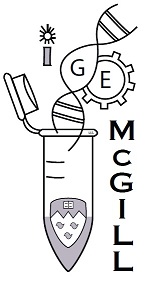Team:McGill
From 2011.igem.org
RayyaAssaf (Talk | contribs) |
|||
| (8 intermediate revisions not shown) | |||
| Line 1: | Line 1: | ||
| + | {| style="color:#1b2c8a;background-color:#0c6;" cellpadding="3" cellspacing="1" border="1" bordercolor="#fff" width="62%" align="center" | ||
| + | !align="center"|[[Team:McGill|Home]] | ||
| + | !align="center"|[[Team:McGill/Team|Team]] | ||
| + | !align="center"|[https://igem.org/Team.cgi?year=2011&team_name=McGill Official Team Profile] | ||
| + | !align="center"|[[Team:McGill/Project|Project]] | ||
| + | !align="center"|[[Team:McGill/Parts|Parts Submitted to the Registry]] | ||
| + | !align="center"|[[Team:McGill/Modeling|Modeling]] | ||
| + | !align="center"|[[Team:McGill/Notebook|Notebook]] | ||
| + | !align="center"|[[Team:McGill/Safety|Safety]] | ||
| + | !align="center"|[[Team:McGill/Attributions|Attributions]] | ||
| + | |} | ||
| Line 4: | Line 15: | ||
{|align="justify" | {|align="justify" | ||
| - | | | + | '''The Team''' |
| - | |[[Image: | + | |Welcome to McGill University’s 2011 iGEM page! Over the summer, our team will be working on building photo-switchable systems for the control of cellular functions in mammalian cells. The wiki page is not complete, but be sure to keep checking for updates! |
| + | |[[Image:logoigemmcgill.jpg|100px|right|frame|align="justify"|''Grandescunt Aucta Labore'']] | ||
|- | |- | ||
| | | | ||
| - | '' | + | '''Project Description''' |
| - | |[[Image: | + | |
| + | ''Optogenetics involves the use of light to remotely control cellular function via light responsive proteins. It is a promising tool for engineering optical regulation of cellular behavior. Unlike most stimuli, light signals have the advantage of being highly precise with regards to temporal and spatial action as well as having readily tunable intensity. Within cells, a variety of effectors can be controlled using light, including DNA binding proteins, enzymes and mediators in signal transduction. Specifically, our projects focus on building light-responsive biobricks for control of mammalian cells by fusing photo-switchable domains found in plant, algal and fungal light-sensing proteins to such effectors. Mammalian biochemistry is complex and well regulated, necessitating synthetic effectors that can be easily and dynamically adjusted to meet the needs of the application. Photo-switchable systems provide this versatility. '' | ||
| + | |[[Image:igemteam.jpg|200px|left|frame|McGill IGEM Team]] | ||
|- | |- | ||
| | | | ||
| - | |||
|} | |} | ||
<!--- The Mission, Experiments ---> | <!--- The Mission, Experiments ---> | ||
| - | |||
| - | |||
| - | |||
| - | |||
| - | |||
| - | |||
| - | |||
| - | |||
| - | |||
| - | |||
| - | |||
| - | |||
Latest revision as of 00:43, 15 July 2011
| Home | Team | Official Team Profile | Project | Parts Submitted to the Registry | Modeling | Notebook | Safety | Attributions |
|---|
| Welcome to McGill University’s 2011 iGEM page! Over the summer, our team will be working on building photo-switchable systems for the control of cellular functions in mammalian cells. The wiki page is not complete, but be sure to keep checking for updates! | |
|
Project Description Optogenetics involves the use of light to remotely control cellular function via light responsive proteins. It is a promising tool for engineering optical regulation of cellular behavior. Unlike most stimuli, light signals have the advantage of being highly precise with regards to temporal and spatial action as well as having readily tunable intensity. Within cells, a variety of effectors can be controlled using light, including DNA binding proteins, enzymes and mediators in signal transduction. Specifically, our projects focus on building light-responsive biobricks for control of mammalian cells by fusing photo-switchable domains found in plant, algal and fungal light-sensing proteins to such effectors. Mammalian biochemistry is complex and well regulated, necessitating synthetic effectors that can be easily and dynamically adjusted to meet the needs of the application. Photo-switchable systems provide this versatility. | |
 "
"

